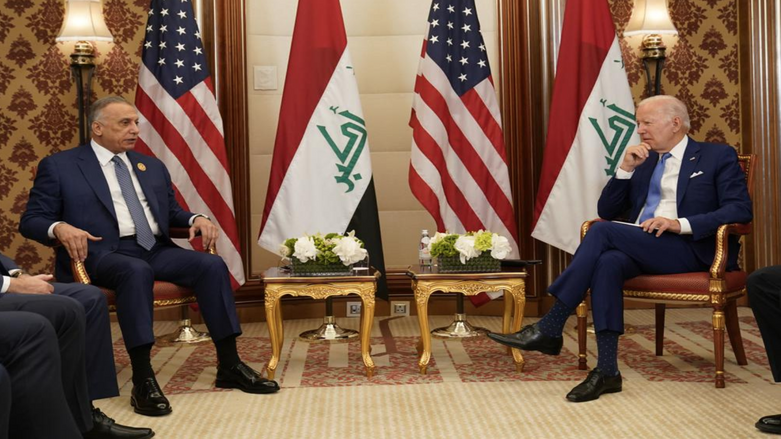Biden reaffirms commitment to Iraq, Kurdistan Region

WASHINGTON DC (Kurdistan 24) – US President Joe Biden met on Saturday with Iraqi Prime Minister Mustafa Al-Kadhimi on the sidelines of the Jeddah summit, which included the leaders of the six Gulf Cooperation Council (GCC) states, along with Iraq, Jordan, and Egypt.
After the meeting between Biden and Kadhimi, the two sides issued a joint statement in which “President Biden underscored the importance the United States places on a stable, united, sovereign, and prosperous Iraq, to include Iraq’s Kurdistan Region.”
More broadly, Biden’s visit to the Middle East, which also included meetings with the Israeli and Palestinian leadership, aimed at two goals previously noted by Kurdistan 24: 1) advancing the normalization of relations between Israel and the Arab states; and 2) increasing Middle Eastern oil production to help the US and its allies confront Russia’s aggression in Ukraine.
On Saturday, a third objective became apparent as Biden addressed the Arab leaders in Jeddah: to reassure them that his administration remained committed to maintaining a significant US presence in the region.
“We will not walk away and leave a vacuum to be filled by China, Russia or Iran,” the US president affirmed. Biden’s position stands in contrast to that of Barack Obama, who sought to reduce George W. Bush’s extensive commitment to far-reaching change in the region. It also stands in contrast to Donald Trump, who carried out a limited withdrawal from northeast Syria, so he could claim to have defeated ISIS—only to see Russia step in.
The Biden administration’s hasty withdrawal from Afghanistan—which saw the collapse of the Kabul government, followed by a swift Taliban takeover of the country—carried risks for the Middle East, above all that the region, leaders as well as people, might conclude that the US would be leaving the Middle East too and adjust their positions accordingly.
However, Biden made very clear that he regards the Middle East—as opposed to Afghanistan—as a strategic region where US interests require a continued presence.
US-Iraqi Ties
Unlike Obama, under whom Biden served as Vice-President, Biden supported the 2003 war that ousted Saddam Hussein and his regime. Indeed, in late 2002, as the Chairman of the Senate Foreign Relations Committee, Biden, along with his Republican colleague, Chuck Hagel, was dispatched by the George W. Bush administration to consult with the Kurdish leadership in preparation for the war coming.
As Biden noted in comments before his meeting with Kadhimi, he has known the Iraqi leader “for a long time,” and “we want to be as helpful as we can” to help you in building Iraqi democracy.
In a joint statement issued after their meeting, the two leaders “reaffirmed their shared commitment to the strong bilateral partnership between Iraq and the United States under the Strategic Framework Agreement and their determination to continue security coordination to ensure that ISIS can never resurge.”
The Strategic Framework Agreement was concluded in 2008 under the Bush administration as it prepared to leave office and sought to establish the basis for an enduring relationship with Baghdad.
The two leaders “also reaffirmed the importance of forming a new Iraqi government,” which is “responsive to the will of the Iraqi people” and reflects “Iraq’s democracy and independence,” their joint statement said.
Over nine months have passed since Iraq’s elections last October, and there is still a caretaker government.
Among the more concrete achievements of the summit was the signing of an agreement between Riyadh and Baghdad that links Iraq to the Saudi electrical grid.
The agreement, which was first mooted in 2016 and only concluded five years later, will increase the availability of electricity in southern Iraq. That has been a serious problem, particularly in the hot summers. Last year, there were widespread protests across the south.
In addition, the new agreement will lessen Iraq’s dependence on Iran for energy supplies.